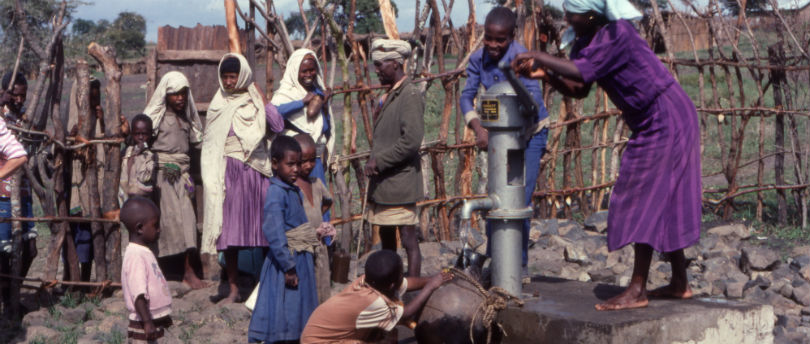Water and sanitation – why community is so important
25/02/2016

Today we attended Buckingham Palace to pick up a Queen’s Anniversary Prize for our research into water and sanitation. It is a real privilege to be recognised in this way, but what is most rewarding is knowing that our research is helping to change the lives of the most impoverished people in the world. Through our work with partners, NGOs, governments and more, water and sanitation researchers at Cranfield have already helped hundreds of thousands of people get access to clean and safe water supplies and sanitation facilities.
Water and sanitation challenges
With over 2.5bn people still without access to sanitation, the work is as important as ever. Children and adults are still dying needlessly because they can only access dirty water. But with this happening in different countries, climates and cultures, the issues are incredibly varied. In dense urban settlements, the challenge is where to site sanitation solutions in a space with no room to install conventional plumbing. For those living in rural areas like farmers in Africa, the challenge is how to maintain and service their supply in a cost-effective way.
More than a tap
Science and engineering developments have the potential to produce some truly innovative solutions that can overcome water and sanitation challenges. But I have worked in India and Africa, and what became abundantly clear to me is how important – vital, in fact – the community is in implementing solutions. Just as in the old proverb, if you give a man a fish he will eat that day, but if you give him a net and teach him how to fish, he will eat for a lifetime. Give a man a tap and he will have access to water until the tap breaks, the pipeline corrodes, and the pump bringing the water from the ground fails…
The work my colleagues and I are doing is very much about delivering the most appropriate technical solutions to social problems. But the social aspect is as important as the technical aspect to deliver a solution that actually works for the people we are trying to help. This is why we call our MSc programme an MSc in Community Water and Sanitation – community needs to be at its heart.
Talking and doing
And, we are not only talking about these issues, we are doing them. Most students on our MSc course do field work and this year, the students I am currently teaching will travel to countries like Ghana, Madagascar or India to work with organisations like WaterAid, IRC and Water and Sanitation for the Urban Poor. I feel strongly that our students should leave with more than just their Master’s – they should also truly appreciate that technical solutions are only part of what needs to be done.
Categories & Tags:
Leave a comment on this post:
You might also like…
Keren Tuv: My Cranfield experience studying Renewable Energy
Hello, my name is Keren, I am from London, UK, and I am studying Renewable Energy MSc. My journey to discovering Cranfield University began when I first decided to return to academia to pursue ...
3D Metal Manufacturing in space: A look into the future
David Rico Sierra, Research Fellow in Additive Manufacturing, was recently involved in an exciting project to manufacture parts using 3D printers in space. Here he reflects on his time working with Airbus in Toulouse… ...
A Legacy of Courage: From India to Britain, Three Generations Find Their Home
My story begins with my grandfather, who plucked up the courage to travel aboard at the age of 22 and start a new life in the UK. I don’t think he would have thought that ...
Cranfield to JLR: mastering mechatronics for a dream career
My name is Jerin Tom, and in 2023 I graduated from Cranfield with an MSc in Automotive Mechatronics. Originally from India, I've always been fascinated by the world of automobiles. Why Cranfield and the ...
Bringing the vision of advanced air mobility closer to reality
Experts at Cranfield University led by Professor Antonios Tsourdos, Head of the Autonomous and Cyber-Physical Systems Centre, are part of the Air Mobility Ecosystem Consortium (AMEC), which aims to demonstrate the commercial and operational ...
Using grey literature in your research: A short guide
As you research and write your thesis, you might come across, or be looking for, ‘grey literature’. This is quite simply material that is either unpublished, or published but not in a commercial form. Types ...







So instead of carrying that water that last mile (or more) why not work with us to provide rotary water barrels into communities that make the differecne immediately? http://www.rotb.co.uk
Happy to discuss ways of working with you Adrian! Can you get in touch with me at a.parker@cranfield.ac.uk ?